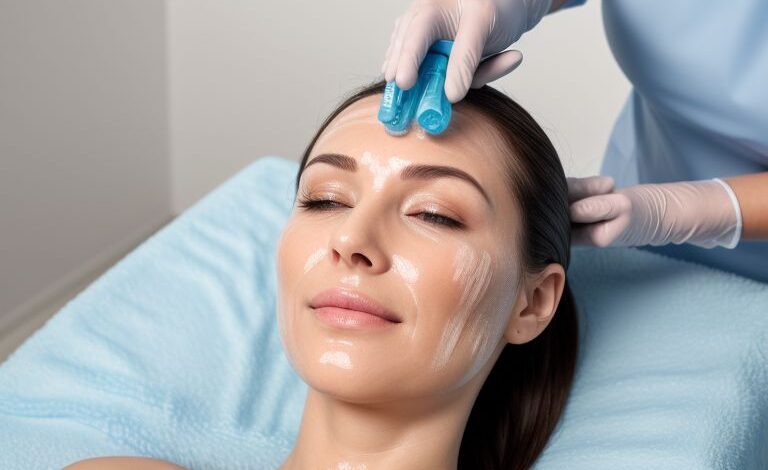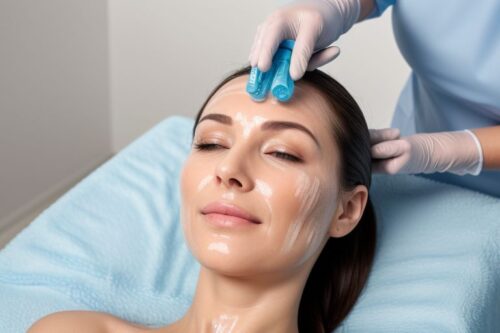
HydraFacials have gained massive popularity in recent years as a go-to treatment for glowing, hydrated skin. Promising deep exfoliation, cleansing, and hydration, this non-invasive facial is often marketed as safe for all skin types. But what happens when things go wrong? If you’ve ever found yourself thinking, “HydraFacial ruined my skin,” you're not alone. Some individuals experience adverse reactions that leave their skin worse than before.
In this article, we’ll dive into what could cause negative reactions to a HydraFacial, how to handle it if your skin takes a turn for the worse, and the before and after scenarios of those whose skin didn’t quite bounce back the way they hoped.

What is a HydraFacial?
A HydraFacial is a multi-step facial treatment that uses a patented device to exfoliate, cleanse, extract, and hydrate the skin. The treatment is praised for its ability to provide instant results, such as smoother, more radiant skin, without the downtime associated with harsher treatments like chemical peels or microdermabrasion. The procedure includes:
- Cleansing and exfoliation: Dead skin cells and excess sebum are removed.
- Gentle acid peel: Mild exfoliation to brighten the skin without causing irritation.
- Extraction: The HydraFacial device uses a vacuum to clean out pores.
- Hydration: Skin is infused with serums that contain antioxidants and peptides for long-lasting moisture and glow.
While the treatment is considered low-risk, some people report that a HydraFacial actually made their skin worse. Here’s why that might happen.
Why Some People Experience Negative Reactions to HydraFacials
HydraFacials are generally considered safe, but adverse reactions can occur for various reasons. If you feel like your HydraFacial ruined your skin, it’s essential to identify what could have gone wrong.
1. Over-Exfoliation
One of the most common issues after a HydraFacial is over-exfoliation. HydraFacials are designed to deeply exfoliate the skin, which can leave it looking polished and bright. However, if your skin is already sensitive or if you’ve been using other exfoliating products (like retinoids or alpha hydroxy acids) prior to your treatment, the extra exfoliation from the facial can cause irritation, redness, or peeling.
2. Allergic Reaction to Serums
The HydraFacial includes the application of serums that contain hydrating ingredients, peptides, and antioxidants. While these are typically gentle, some people may have allergic reactions to certain ingredients. This can lead to breakouts, itching, and swelling, leaving your skin looking worse after the treatment.
3. Pre-Existing Skin Conditions
If you have pre-existing skin conditions like rosacea, eczema, or active acne, a HydraFacial could potentially aggravate your skin. The vacuum suction and exfoliation could disrupt your skin barrier, leading to flare-ups of these conditions.
4. Improper Technique
Not all estheticians are equally skilled or experienced in performing HydraFacials. If the procedure isn’t performed correctly, it could cause problems. The suction might be set too high, causing irritation, or the serums might not be suitable for your specific skin type.
Before and After: What Happens When a HydraFacial Goes Wrong?
If a HydraFacial didn’t give you the glowing skin you hoped for, you might notice negative changes in your skin immediately after the treatment or in the days that follow. Here’s a typical before and after breakdown when things go awry:
Before HydraFacial:
- Mild acne or congested skin
- Dullness or dry patches
- Uneven texture, minor blackheads
- Excitement for a glowing, refreshed complexion
After HydraFacial (When Things Go Wrong):
- Redness and irritation: Your skin may feel raw and look red, especially if it was over-exfoliated.
- Breakouts: You might notice an increase in acne or even cystic pimples if your skin reacted poorly to the serums or vacuum suction.
- Dryness and flaking: Instead of feeling hydrated, your skin may become excessively dry and flaky, a sign of an impaired skin barrier.
- Swelling: In severe cases, your face may swell, particularly around sensitive areas like the eyes or cheeks.
- Hyperpigmentation: If your skin is prone to dark spots, inflammation caused by over-exfoliation or irritation may trigger post-inflammatory hyperpigmentation (PIH), making dark spots more noticeable.
How to Recover If a HydraFacial Ruined Your Skin
If you're dealing with the aftermath of a bad HydraFacial, don’t panic. There are steps you can take to help your skin heal and get back to normal.
1. Stop Using Active Ingredients
One of the first things you should do if you’re experiencing irritation or breakouts after a HydraFacial is to stop using harsh, active ingredients in your skincare routine. Avoid products that contain retinoids, acids (such as glycolic, salicylic, or lactic acids), or vitamin C. These can further irritate your skin and prolong the healing process.
2. Use Gentle, Hydrating Products
Switch to gentle, hydrating products to help restore your skin’s barrier. Look for products that contain hyaluronic acid, ceramides, and niacinamide to soothe inflammation and provide moisture without clogging your pores.
- Gentle cleansers: Opt for a non-foaming, sulfate-free cleanser to avoid stripping your skin.
- Moisturizer: Choose a fragrance-free, non-comedogenic moisturizer to lock in hydration.
- Barrier-repair creams: Products containing ceramides and fatty acids can help rebuild your skin’s protective barrier.
3. Avoid Sun Exposure
If your skin is red, peeling, or inflamed, it’s crucial to stay out of direct sunlight. Sun exposure can worsen hyperpigmentation and delay healing. Always wear a broad-spectrum sunscreen with at least SPF 30, even if you’re staying indoors, as UV rays can penetrate through windows.
4. Apply Cold Compresses
If you’re dealing with swelling or severe irritation, applying a cold compress to your face can help soothe your skin and reduce inflammation. Avoid using ice directly on your skin, as this could cause further damage. Instead, wrap an ice pack or cold washcloth in a soft cloth and apply it to the affected areas for 10-15 minutes at a time.
5. Consult a Dermatologist
If your symptoms persist or worsen, it’s important to consult a dermatologist. They may prescribe topical steroids or other medications to reduce inflammation and help your skin recover more quickly. In severe cases, they might recommend treatments like light therapy or chemical peels to address issues like scarring or hyperpigmentation caused by the HydraFacial.
Preventing HydraFacial Side Effects: What You Need to Know Before Booking
If you're considering a HydraFacial but are worried about potential side effects, here are some tips to minimize the risks:
- Patch test the serums: Ask your esthetician to perform a patch test of the serums on a small area of your skin to ensure you won’t have an allergic reaction.
- Communicate with your esthetician: Make sure to inform your esthetician about any skin conditions or sensitivities you have, including the products you're using at home.
- Avoid exfoliating before your treatment: Skip harsh exfoliants, scrubs, and retinoids for at least a few days before your HydraFacial to avoid over-exfoliation.
- Research the esthetician: Choose a licensed, experienced esthetician with a good reputation for performing HydraFacials. An experienced professional will tailor the treatment to your skin type and needs, reducing the likelihood of complications.
The Bottom Line: Not Every HydraFacial is Perfect
While HydraFacials are highly effective for most people, they’re not without their risks. If you’ve experienced an issue and feel that the HydraFacial ruined your skin, you’re not alone—many people have had less-than-ideal experiences, especially if the treatment wasn’t tailored to their specific skin type or needs.
The good news is, with the right recovery routine and professional help if necessary, your skin can heal and return to a healthy state. And if you’re considering a HydraFacial, make sure to take precautions by researching your provider and discussing your skin concerns before proceeding.
Final Thoughts
A HydraFacial gone wrong can be frustrating and even damaging to your skin. The key to preventing and treating these reactions lies in understanding your skin type, communicating with your esthetician, and taking proper care afterward. Remember, if you experience any severe reactions, don’t hesitate to seek professional help to ensure a safe and speedy recovery.

